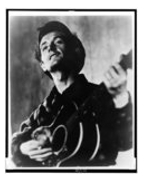The Woody Guthrie Archives, based in New York, will move to his home state of Oklahoma and the Route 66 city of Tulsa by 2013, according a story late Tuesday by the New York Times.
The Tulsa-based George Kaiser Family Foundation bought the musician’s archives from the Guthrie family for about $3 million and will move them into  the Brady District, north of downtown Tulsa.
the Brady District, north of downtown Tulsa.
Woody Guthrie, long considered the patron saint of folk music, was born in Okemah, Okla., which hosts an annual free folk festival in his honor.
The announcement comes just before when his 100th birthday will be celebrated in 2012. The Kaiser foundation will host a conference and concert at the University of Tulsa on March 10.
The Times reported:
“Oklahoma was like his mother,” said his daughter Nora Guthrie, throwing back her tangle of gray curls as she reached out in an embrace. “Now he’s back in his mother’s arms.”
The archive includes the astonishing creative output of Guthrie during his 55 years. There are scores of notebooks and diaries written in his precise handwriting and illustrated with cartoons, watercolors, stickers and clippings; hundreds of letters; 581 artworks; a half-dozen scrapbooks; unpublished short stories, novels and essays; as well as the lyrics to the 3,000 or more songs he scribbled on scraps of paper, gift wrap, napkins, paper bags and place mats. Much of the material has rarely or never been seen in public, including the lyrics to most of the songs. Guthrie could not write musical notation, so the melodies have been lost.
Guthrie’s previously unrecorded lyrics have spawned at least three albums — “Mermaid Avenue” and “Mermaid Ave. Vol. II” by Billy Bragg and Wilco, and the recently released “Note of Hope,” by a variety of rock and folk artists.
A message from Nora Guthrie, daughter of Woody and the curator of the archives, posted a message on the Woody Guthrie website that’s worth reading in full. A few excerpts:
Over the years, we’ve had a few requests for the Archives from a number of places; public institutions, universities, etc. In thinking about it, I always felt that Oklahoma was calling . All the major universities where many of these kinds of collections end up, seemed a bit too “precious”, too many stairs to climb. And it also seemed to me that most of the national institutions already had more than they can handle, with much of their collections sitting on basement shelves, awaiting a possible exhibit if the funding comes through. I discovered that the folks at the Kaiser Foundation are an extraordinary group of local people, working in many ways that benefit so many people. In particular, the 25 preschool centers they run bring the highest available educational facilities to so many of Tulsa’s neediest. It’s beyond impressive. It’s visionary. I sensed I could work with these people to create something really unique.
The next day I was walking around the Brady district in downtown Tulsa. I got to meet many of the local artists who were living and working in the old warehouse spaces; violin makers, furniture makers, visual artists, punk rock musicians, et al. It felt so much like the early ‘60s in Soho and the East Village. I felt an easy kinship with them, as I think my father would have. […]
Why do people like Woody Guthrie leave their hometowns? Why do talented, inspirational and visionary people have to leave for cities like New York? Why do they often say, “I couldn’t grow there”? Why do some people think they alone own the American flag? Why do some people claim they’re more “American” than others? Why do some people think they are uniquely qualified to pull the strings of democracy? These are many of the questions that Woody sang about in his songs, looking for his own answers. Luckily, all of these questions are presently alive and kicking, now often hotly debated in small towns and cities just like Tulsa all across the country. I think it’s a good time to bring Woody’s own thoughts on these topics back home. And being close to where new art and new thoughts are being born is always inspirational. To be a part of this Oklahoma “renovation” feels like being in the right place at the right time aka “grace”. Or maybe just luck.
As the Times story makes clear, Oklahoma has been reluctant to embrace Guthrie because of his communist/socialist leanings. However, Guthrie was a product of his time. During the first few decades of the 20th century, Oklahoma became of a hotbed of socialist and communist advocacy. Also, communist sympathizers should be given a bit of a pass when they came of age during the Great Depression,when it appeared capitalism was collapsing.
I (and many others) also tend to overlook a musician’s political leanings as long as the music is good. I’ve enjoyed songs by the right-wing Ted Nugent and the left-wing Rage Against the Machine, and still do.
In Woody’s case, the music is very good indeed. You’d be hard-pressed to find a song that conveys America’s glories and possibilities than his best-known song, “This Land is Your Land.”
And when you’re watching a documentary about the Depression, you probably won’t find better a better soundtrack than Woody’s Dust Bowl Ballads. Here’s one, about Route 66 itself:
https://youtu.be/5cNebVCVou0
This announcement is a big, big deal for Tulsa. The Woody Guthrie Archives will draw many Route 66 travelers and non-66ers alike.
Great news for Tulsa. From their website, it looks like GKFF if more of a funding than an operating organization. Are they perhaps placing the collection in an existing museum?
No, the collection is going into an existing warehouse building that’s been renovated as we speak.